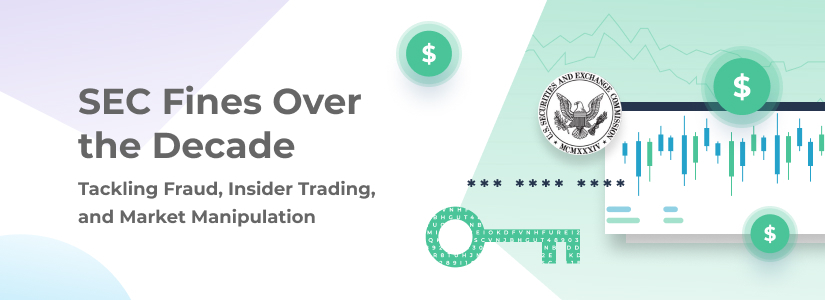SEC Fines Over the Decade: Tackling Fraud, Insider Trading, and Market Manipulation

The U.S. Securities and Exchange Commission (SEC) has imposed significant fines on financial
institutions over the past decade, primarily for violations related to securities laws, insider
trading, fraud, and market manipulation. While it’s challenging to pinpoint an exact total without
a detailed breakdown of individual cases, here’s a general overview based on available data
from major fines and enforcement actions:
1. Total Fines and Penalties Overview (2013-2023):
From 2013 to 2023, the U.S. Securities and Exchange Commission (SEC) significantly ramped up its enforcement efforts, particularly in response to financial scandals, market manipulation, and increasing complexity in the financial markets. The total amount of fines, penalties, and disgorgement (the repayment of illegal profits) over this period is estimated to exceed $50 billion. This figure includes fines on financial institutions, corporate entities, and individual actors for violations such as fraud, insider trading, failure to disclose risks, and misleading investors.
Annual Collections: On average, the SEC collected between $3 billion to $5 billion annually. However, in more recent years, the fines have trended higher, as the SEC has aggressively pursued larger cases involving systemic fraud and misconduct.
Record Year in 2022: In 2022, the SEC collected a record $6.4 billion in total penalties and disgorgements. This included significant fines on Wall Street banks, investment firms, and other financial institutions. A notable shift in the SEC’s enforcement was its focus on technology and cryptocurrency-related violations, reflecting the rise of fintech and decentralized finance
platforms.
2. Key Areas of Enforcement and Major Cases:
The SEC has targeted a variety of sectors within the financial services industry over the past decade, and its enforcement efforts have focused on several key areas:
A. Fraud and Misleading Investors:
Financial institutions have been fined heavily for misleading investors about risks, returns, or the nature of their products.
- Wells Fargo (2020): One of the most high-profile cases of the past decade was the $3 billion settlement with Wells Fargo. This fine related to the bank’s massive fake accounts scandal, in which bank employees created millions of unauthorized accounts to meet aggressive sales targets. The SEC found that Wells Fargo misled its investors by falsely portraying itself as a model of “cross-selling” success.
- Goldman Sachs (2020, 2021): Goldman Sachs paid $2.9 billion in 2020 to resolve charges related to the 1MDB scandal, a global corruption case involving billions of dollars siphoned from the Malaysian sovereign wealth fund. The SEC’s portion of the settlement focused on Goldman’s misleading representations to investors. The following year, Goldman Sachs was fined for failing to adequately disclose conflicts of interest in certain transactions.
B. Insider Trading:
Insider trading has been a consistent target of SEC enforcement. The commission has taken actions against both high-profile traders and institutional actors who took advantage of non-public information for profit.
- Steve Cohen and SAC Capital (2013): One of the largest insider trading fines in recent history involved SAC Capital Advisors, run by billionaire investor Steve Cohen. The firm paid $1.8 billion in fines and penalties for rampant insider trading violations, with the SEC and other federal agencies coordinating the settlement.
- Raj Rajaratnam (2011): Although slightly outside the 10-year window, the $92.8 million fine imposed on Galleon Group’s founder for insider trading remains one of the largest individual fines ever. This case set a precedent for SEC actions against insider trading networks operating within hedge funds and investment firms.
C. Market Manipulation:
The SEC has aggressively pursued cases involving market manipulation, such as spoofing (placing orders with no intention of executing them to influence prices), pump-and-dump schemes, and fraudulent trading practices.
- JP Morgan Chase (2020): In one of the largest fines for market manipulation, JP Morgan paid $920 million in a settlement over charges of manipulating metals and Treasury markets. The bank’s traders were found guilty of spoofing to distort market prices and gain an unfair advantage in trading, a practice that violated multiple securities laws.
- Merrill Lynch (2016): Merrill Lynch (a subsidiary of Bank of America) was fined $415 million for misleading investors about how it handled customer funds. The SEC’s investigation revealed that Merrill Lynch had used customer cash to finance its own trading activities, which increased risks to customers.
D. Cryptocurrency and Fintech Violations:
In recent years, the SEC has expanded its enforcement activities to cover the rapidly growing cryptocurrency and fintech sectors.
- BlockFi (2022): The SEC fined BlockFi $100 million for failing to register its crypto lending products as securities and for making misleading statements about its risk levels to investors.
This was one of the largest cryptocurrency-related settlements, signaling the SEC’s intention to regulate this burgeoning sector. - Ripple Labs (Ongoing): Ripple Labs, the creators of the XRP cryptocurrency, has been fighting an ongoing legal battle with the SEC. The SEC claims that Ripple raised $1.3 billion through
the sale of unregistered securities (XRP tokens). Although the case is still in progress, it represents one of the largest regulatory actions against a major crypto company.
E. Ponzi Schemes and Fraudulent Securities Offerings:
The SEC has also focused on breaking up Ponzi schemes and fraudulent offerings, which have caused billions of dollars in losses to investors.
- Woodbridge Group (2017): The real estate investment company Woodbridge Group of Companies, LLC, was ordered to pay $1 billion in penalties and disgorgement after being found guilty of running a Ponzi scheme that defrauded thousands of investors. The scheme involved fake real estate investments that promised high returns but ultimately led to massive investor losses.
3. Key Trends in SEC Enforcement:
A. Increased Focus on Individual Accountability:
In recent years, the SEC has emphasized holding individual executives and corporate officers accountable for misconduct, alongside the institutions themselves. This has resulted in numerous high-profile settlements where both the company and key decision-makers were personally fined or banned from working in the industry.
B. Rise of Cryptocurrency and Technology-Related Cases:
The rise of blockchain technology and digital assets has led to a corresponding increase in SEC enforcement actions. Many crypto firms have faced scrutiny for offering unregistered securities, misleading investors, or failing to comply with basic financial regulations.
C. Coordination with Other Agencies:
The SEC often works in conjunction with other regulatory bodies, such as the Department of Justice (DOJ), the Commodity Futures Trading Commission (CFTC), and international regulators, to impose more significant penalties. Some of the largest fines of the last decade, such as the Goldman Sachs 1MDB case, were part of broader global enforcement actions.
4. Challenges and Criticism:
Despite record fines, the SEC has faced criticism regarding the effectiveness of its penalties. Critics argue that many large financial institutions see these fines as a “cost of doing business” rather than a genuine deterrent. Moreover, fines, though large, often pale in comparison to the profits gained from illegal activities. There has also been debate about the SEC’s enforcement resources, with calls for more funding and staffing to handle the growing complexity of financial markets and the rise of decentralized finance.
Conclusion
Over the past 10 years, the SEC has collected tens of billions of dollars in fines from financial institutions, targeting a wide array of misconduct from insider trading to cryptocurrency fraud. As the financial landscape continues to evolve, especially with the growth of fintech and decentralized markets, the SEC’s enforcement priorities and fines are likely to continue increasing. The record fines of 2022 suggest that the agency is stepping up its efforts to keep pace with the rapid changes in global financial markets.

